Lee Hyun Il took the crucial final point to send Korea into the men’s team badminton semi-finals at the Incheon Asian Games, denying Takuma Ueda the winning role he played in Japan’s Thomas Cup final victory earlier this year.
Story and photos: Don Hearn, Badzine Correspondent live in Incheon
China and Malaysia may have made short shrift of their quarter-final opponents in the men’s team badminton competition at the 2014 Incheon Asian Games but the showdown between Thomas Cup holders Japan and hosts Korea, who are looking for their fourth straight appearance in an Asian Games men’s team final, was exactly what it promised to be, with a full five matches, three of them upsets.
Son Wan Ho (pictured) was up first with the unenviable task of taking on Tago Kenichi, the man who beat the man who is now World Champion to kick off Japan’s miracle semi-final victory.
“We knew that the Japanese team would have a lot of confidence after winning the Thomas Cup,” said Son Wan Ho after the match. “I am just really satisfied that I was able to win the first match because winning the first match is so important for the whole mood of the team. I was a little nervous in the first game but I know how Tago plays and I’m happy to get this win over a higher-ranked player.”
Korea’s preference is always to rely on their men’s doubles strength in team matches but world #1 Lee Yong Dae / Yoo Yeon Seong (pictured) did not inspire the usual confidence with their performance in the first game against Hiroyuki Endo / Kenichi Hayakawa.
“We were quite nervous during this match and although we did settle our nerves and finish strong, we hope to be able to start our match tomorrow more comfortably,” said Lee Yong Dae afterward.
The Koreans did settle in and build up a big lead in the second but a combination of slow shuttles and excellent Japanese defense saw some rally turn into a clear-fest that looked more like a warmup than a world-class doubles match.
“We weren’t having much success with attacking play on one end of the court so we tried to take something off our smashes and wait for the Japanese players to make mistakes,” said Lee. “Simply continuing to try to win by attacking wouldn’t have been wise from a stamina perspective.”
Lee Dong Keun was the first Korean to start out strong, as he trounced Kento Momota (pictured) in the first game of the third match. He was not able to hold on, however, and Kento won in three.
Kento thus got Japan right back into the tie and he continued his role as the go-to man in Japanese team events. Kento, of course, was instrumental in taking Japan’s first ever Asian Junior team gold here in Korea just two years ago. Now, as a senior player, he has already become the hero of Japan’s Thomas Cup team before taking his first major individual title.
“I love playing in the team events. I think the motivation of trying to win a point for the Japanese team really works for me,” said Momota.
It actually looked as if Kento’s boost might have been all the Japanese team needed as Takeshi Kamura / Keigo Sonoda (pictured) promptly proceeded to shut down World Champions Ko Sung Hyun and Shin Baek Cheol in straight games and get their team back level at two matches apiece.
This was the second top Korean pair that Kamura and Sonoda had gotten the better of, after seeming to wait for the opportunity to take their opponents on Korea soil.
“This was our first time beating Ko and Shin but we won against Kim and Kim at the Korea Open,” said Kamura after their victory, “but we still haven’t beaten Lee and Yoo so we hope to, the next time we meet. Not necessarily in Korea, but wherever. Playing them in Korea is no problem.”
It was then down to Lee Hyun Il to prove his worth as Korea’s not-so-secret weapon at third singles. Lee, too, dropped his first game – leaving Korea trailing for the first time in the tie since Tago went one game up – but came back to beat Takuma Ueda decisively in the second and third to save the victory for the home team.
“In the first game, I didn’t really know to play against this opponent and I found it difficult,” admitted Lee Hyun Il afterward. “From the second game, I was able to control the match better.
“I realize that all of my opponents will be younger and fitter athletes but so far, fortunately, that hasn’t been a factor.”
Asked to look ahead to a possible showdown with Lin Dan, whom he beat in the team event in Doha, Lee replied, “I realized coming into the Asian Games, who the ranking order determined I might have to play against and that Lin Dan was among them but I’m trying not to get caught up thinking about that. I am just going to prepare for my matches as they come.”
Of course, Lee Hyun Il was an important part of the 2002 team that won gold at the Busan Asian Games, as well as the two silver medal-winning efforts since. However, things are very different now from what they were 12 years ago, when he was in the early days of his career, before he’d won Asian Games gold or reached world #1.
“Actually, the situation was somewhat similar in 2002 to how it is now,” says Lee. “Then, too, we had two doubles pairs who were so strong that we really relied on them for two points. This year is the same in that we have doubles pairs who are top shelf and if they produce, then our team has a chance.”
In a way, the Lee Hyun Il we saw on court capping off that win over Ueda looked a little more like his 2002 self as he eschewed his normal preference for defensive play to leap around the court and attack at every opportunity.
“Yes, that’s true but once it gets to a third game, there’s nothing after that and when the chances come, I really want to take them and finish off the rallies,” admitted Lee. “But I am still not looking to just finish off rallies with one shot. Every rally, I am choosing my strokes to set up that attacking opportunity.”
Asked how he came to be answering the call to play again with the national team in Incheon, after his 3rd comeback from his 3rd retirement had hitherto been kept completely separate from national team activities, he said, “The BKA basically looked at the situation with the Asian Games being hosted in Korea and the fact that I hadn’t been playing and thus had a very low ranking struck them as an opportunity because I could play 3rd singles. From my standpoint, I thought of course, if I could help the team, I would.”
Indonesia makes early exit
After Chinese Taipei’s striking wins over Thailand in both the men’s and women’s events on Saturday, the men found success again in the quarter-finals. It almost seemed like a forgone conclusion as soon as Chou Tien Chen put his team ahead with a win over world #5 Tommy Sugiarto.
Indonesia, of course, came to Incheon with a seriously weakened singles squad but their veterans did not even have to beat up on both of the youngsters backing up Sugiarto. Chen Hung Ling / Liao Min Chun (pictured) beat Angga Pratama / Rian Agung Saputro in straight games to book Chinese Taipei’s date with the hosts in the semi-final.
Meanwhile, Malaysia and China both went through in three straight games to give Lee Chong Wei a chance to avenge his loss to Chen Long (pictured above) in last month’s World Championship final.
Click here to see results from tournamentsoftware
![ASIAN GAMES Men’s Team QF – More Hyun Il heroics Lee Hyun Il took the crucial final point to send Korea into the men’s team badminton semi-finals at the Incheon Asian Games, denying Takuma Ueda the winning role he played […]](http://www.badzine.net/wp-content/uploads/Newsflash-thumbnail.png)
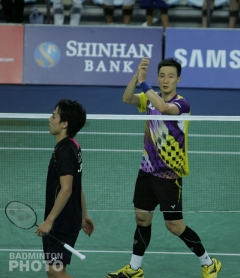
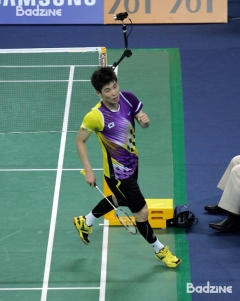
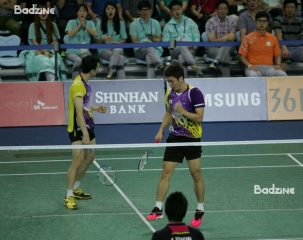
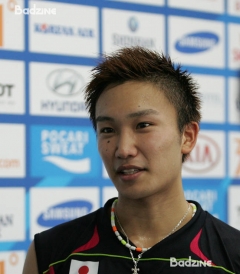
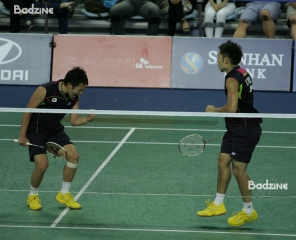
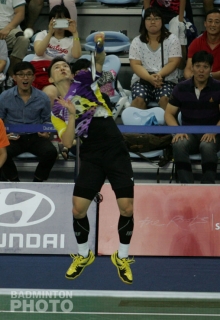
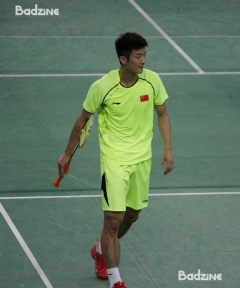
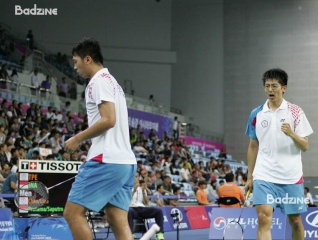

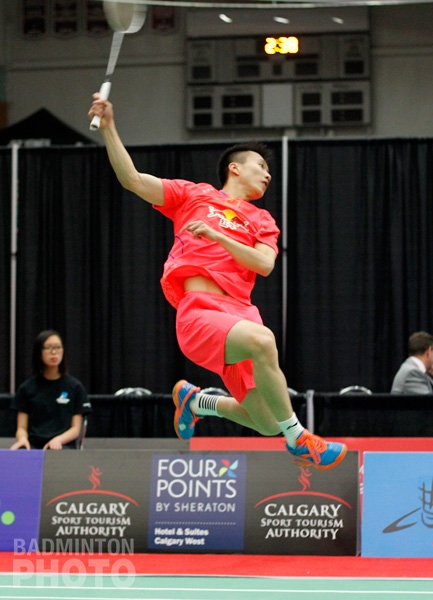
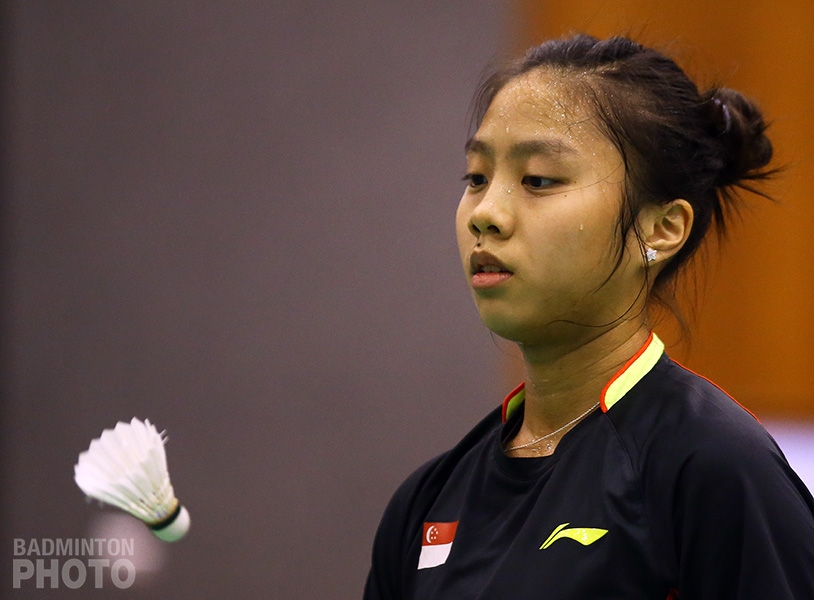
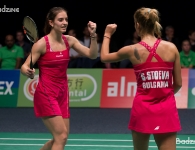
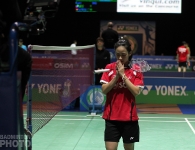
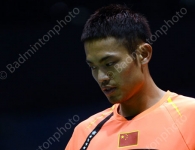
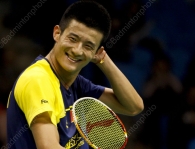
Leave a Reply